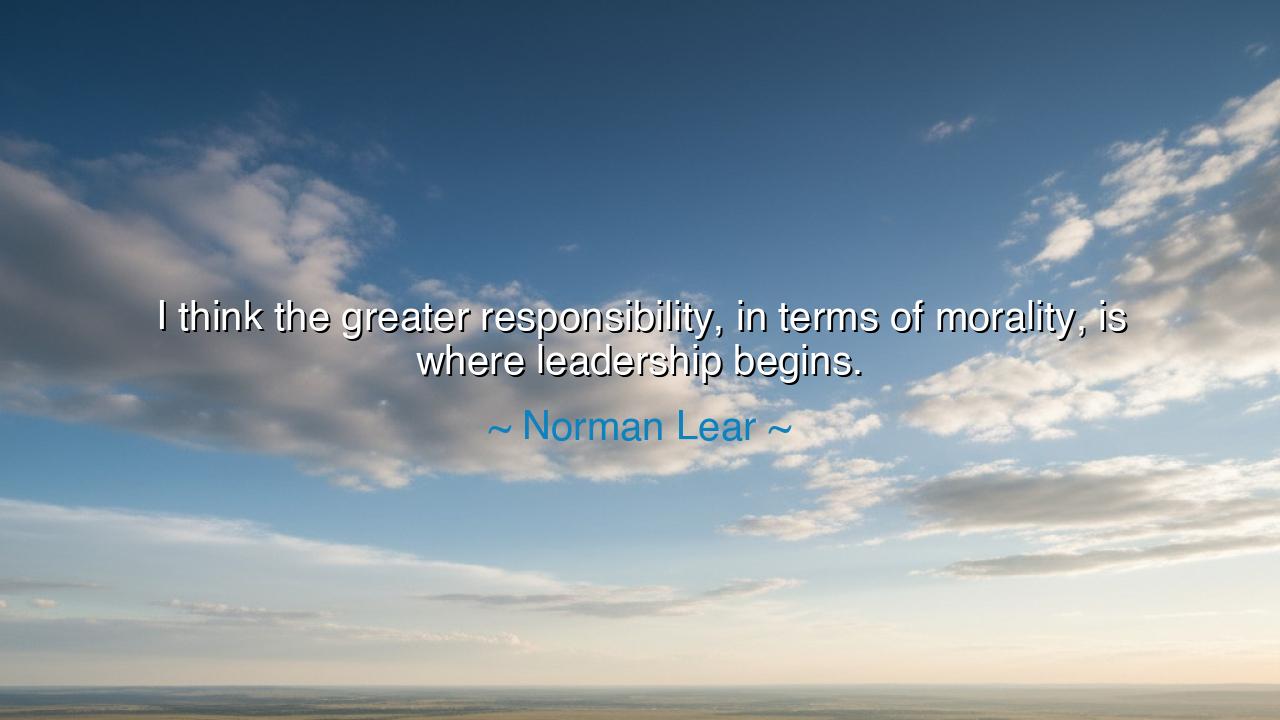
I think the greater responsibility, in terms of morality, is






Norman Lear, the great storyteller of America’s conscience, once declared: “I think the greater responsibility, in terms of morality, is where leadership begins.” These words shine like a beacon through the ages, reminding us that power without morality is corruption, and leadership without responsibility is tyranny. Lear, who through his art sought to awaken a nation’s heart, here speaks the truth of all ages: that to lead is not first to command, but to bear the heavier burden of righteousness.
The meaning of this teaching is clear. Many desire to lead, craving authority, titles, and acclaim. But true leadership is not born in desire for recognition—it is born in the crucible of responsibility. It begins when a man or woman says, “I will bear the weight that others cannot. I will choose what is right, even if it costs me.” Without this foundation, no throne is steady, no crown secure, no banner lasting. The tyrant rules for a season, but the moral leader plants seeds that bloom for generations.
The ancients knew this truth. Consider Marcus Aurelius, the philosopher-king of Rome. Surrounded by wars and plague, he could have lived in luxury and distance from the suffering of his people. Yet in his Meditations he reminded himself daily that a ruler’s first duty was to live with justice, humility, and wisdom. His morality guided his leadership, and though centuries have passed, his words still inspire, while the names of many richer, louder emperors are forgotten dust.
Norman Lear himself embodied this spirit in his craft. Through television he held a mirror to society, daring to show the struggles of working families, the hypocrisies of prejudice, the moral tensions of modern life. His art did not shy away from discomfort, because he believed responsibility lay in telling the truth. In this way, he showed that leadership is not only in politics or battlefields—it can be in the stories we tell, the platforms we hold, the choices we make when others are watching. To lead is to act with morality, whether one commands an empire or a single household.
History offers another lesson in the figure of Nelson Mandela. For twenty-seven years he sat in prison, stripped of freedom, yet when power at last was given into his hands, he chose not revenge but reconciliation. His leadership began in responsibility: the responsibility to heal a broken nation, to lift his people without plunging them into greater bloodshed. Here we see Lear’s truth embodied—when morality governs leadership, the world itself can be renewed.
The lesson, then, is this: never seek leadership for its own sake. Seek instead to be responsible—responsible for your family, your community, your nation, and for the stranger at your door. If you cultivate this responsibility, leadership will find you, for people are drawn not to those who boast, but to those who serve. Morality is not weakness, but the highest strength, for it guides the hand of power with justice and compassion.
And what must you do in daily life? Begin where you stand. If you are entrusted with children, lead them by example. If you are entrusted with work, carry it with honesty. If you are entrusted with influence, however small, let it be governed by morality. Do not ask first, “What do I desire?” but “What is my responsibility?” For here, as Lear says, true leadership begins—not in ambition, but in duty, not in pride, but in service.
Future generations, remember: crowns are heavy not because of their gold, but because of their responsibility. To lead without morality is to betray the trust of those who follow. To lead with morality is to walk in the path of the great, leaving behind not only monuments of stone, but living legacies of justice and hope.






AAdministratorAdministrator
Welcome, honored guests. Please leave a comment, we will respond soon